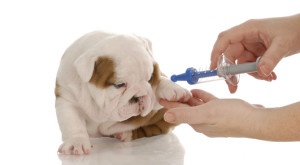Posts Tagged ‘vaccinations’
How To Protect Your Pet From The Heat
 Protecting your pet from the heat is extremely important. As temperatures rise, it becomes more and more uncomfortable to be outside. This is true for your dog as well. During the summer, it is healthier for your dog if you limit outside time, time in dog parks, and exercise to cooler parts of the day, such as morning and evening times. It is not always the temperature as well. The humidity can cause your dog to have difficulty panting. Panting helps your dog cool itself off. Without being able to pant, your dog’s temperature can rise that can lead to heatstroke. If your dog is exhibiting any of the signs of overheating (heavy panting, heavy drooling, trouble breathing, rapid heartbeat, dark or red gums and tongue, dizziness, and weakness, or agitation), be sure to bring your dog to the vet right away. To avoid overheating, there are multiple things that you can do to keep your puppy cool during the hot summer.
Protecting your pet from the heat is extremely important. As temperatures rise, it becomes more and more uncomfortable to be outside. This is true for your dog as well. During the summer, it is healthier for your dog if you limit outside time, time in dog parks, and exercise to cooler parts of the day, such as morning and evening times. It is not always the temperature as well. The humidity can cause your dog to have difficulty panting. Panting helps your dog cool itself off. Without being able to pant, your dog’s temperature can rise that can lead to heatstroke. If your dog is exhibiting any of the signs of overheating (heavy panting, heavy drooling, trouble breathing, rapid heartbeat, dark or red gums and tongue, dizziness, and weakness, or agitation), be sure to bring your dog to the vet right away. To avoid overheating, there are multiple things that you can do to keep your puppy cool during the hot summer.
To begin, make sure to keep your dog groomed, especially if they have long fur. Each breed has different needs. For example, dogs with short, thin coats handle heat better than cold weather and mountain dogs. No dog is immune to heatstroke or paw pad burns, so it’s important to keep your dog groomed. If you get any mats and tangles out of their fur, it will help keep them cool. However, don’t shave or clip their coat until you talk to your vet or groomer. The extra fur that helps your dog stay warm in the winter may also keep it cool in the summer. To keep your dog’s paw pads safe, stick to shaded areas or bring insulation booties to protect your dog’s feet from the hot pavement. To test the heat of the pavement, feel it with the back of your hand. If it is too hot for you, then it is definitely too hot for your dog.
Similarly, be sure to keep your dog’s shots up to date, especially in the summer. The parvovirus spreads in hot weather. During the summer, your dog probably spends more time outside which means that it could come in contact with an animal that has rabies. Summer is also a high season for fleas and mosquitos, both which carry many diseases. By giving your dog medication to prevent these pests, your dog will be safer in the long run.
This should go without saying but leave your pet at home unless your destination is pet friendly. Do not leave your pet in your car. Even with the windows of your car cracked, the temperature inside the car rises rapidly in the summer heat. Similarly, keep your dog’s water supply full. Be sure that there are multiple bowls available for your dog that are always filled with fresh water that is clean. Even if you think that the walk you are going on will be short, be sure to bring clean drinking water and a dish that your dog can easily drink from. If you are worried that your pet is not drinking enough water, add some ice cubes to the bowl. It will make drinking water more appealing to dogs.
When you are spending days outside by a pool or a lake, you can do many things to keep your dog cool while you enjoy the summer sun. You can freeze containers of water so that they will stay cooler for longer. Be sure to keep their water in the shade. You can also provide a small kiddie pool or a sprinkler for your dog to play in. These allow fun places for your dog to cool off and maybe even get some exercise. Similarly, you could put a pet-friendly dig area for your dog in your yard. These can include a sandbox area that your dogs are able to dig in. Dogs often dig a hole to sit in and keep cool. To make an even cooler area, you can spray sand with your cold water. Be sure to make sure that it is located in the shade and not in the sun.
Sometimes, a little extra help is needed to cool your dog. Dog cooling mats and cooling vests are great products. Many work by soaking them in cool water for a long time. If you don’t have access to these, you can soak a towel in cool water and let your dog lie on it. You can also spray your dog’s belly and paws to cool them down. Dogs will cool down more quickly through their belly and paws than water sprayed on their back. Another great DIY to keep your dog cool is to put a pan of ice water in front of the fan to make it more effective for your pup to stay cool.
There are many similar DIYs to keep your pet cool in the summer. Dog-Safe ice cream exists, and you can make it at home. Here is a big list of easy to make ice creams that won’t cost an arm and a leg unlike the gourmet pet store ice-creams. You can also make some frozen treats to put in your dog’s favorite toy. Kong toys come in all shapes and sizes because all dogs love them. They are tough rubber chew toys that are meant to be filled with yummy sticky treats like peanut butter to keep your dog occupied for a while. There are pet-friendly recipes available that are meant to be frozen to keep your dog refreshed while they lick the center. Similar to the Kong treats, you can freeze your dog’s favorite treats in a popsicle mold and fill it with water. It will give your dog a fun treat to keep them cold.
The summer gives many fun opportunities for you and your family. You wouldn’t allow a member of your family to overheat, so don’t let your dog (a furry family member). By following the simple rules of pet care and making some fun treats that your dog will enjoy, you and your dog can have a healthy and cool summer! Make sure to contact our office if you have any questions!
Why Should I Vaccinate My Pet?
“I figured, what’s the worse that could happen? If he got sick, I’d take him to the vet. Well, he got sick. Real sick. It kills me to think about how scared, how weak he looked, and how despondent my kids were. He was the star of the house. And he was gone, just like that.”
Some days in our clinic, we see this. Clients bringing in their lifeless pets for us to treat and nurse their beloved pet back to health. Sometimes this could have been preventable if only they had vaccinated their pet.
If you have paid attention to the media, there is a lot of discussion on whether you should vaccinate your children or not. Unfortunately, this discussion also crops up in veterinary medicine—whether to vaccinate your pet or not.
There are only two reasons to vaccinate. They are to protect your pet and protect the pets and people around us. Cat and dog diseases still exist and can infect any pet that is not protected. You never know when or where your pet can be exposed. Vaccinations are the best way to stimulate the immune system to stop diseases when exposed and for the vast majority of pets, the benefits of vaccinating far outweigh the risks.
We can’t depend on other pet owners to provide the proper vaccinations to their pets so that our pet has less opportunity to get a disease. So by vaccinating we are cooperating will all individuals to reduce the possibility of spreading disease.
There are several reasons that you should vaccinate your pets. The first and foremost is that with some diseases, it is the law. It is mandatory that you have your pet vaccinated against rabies in every U.S. State. Even pets kept indoors can potentially be exposed if the get out unexpectedly or an uninvited animal gets in the house. The important thing about rabies is that humans can get it and it is fatal.
Several diseases can be transmitted from pets to humans such as rabies and Leptospirosis. Vaccinating your pet helps reduce the risk of human infection and is especially necessary if there are young, elderly, or immune-compromised members in your household.
Many people have their pet groomed, boarded, or attend doggy daycare. If you do, most places require that you pet have a vaccine against kennel cough. This disease is a hacking cough that is highly contagious. Although the disease is relatively mild, it can sometime lead to severe pneumonia.
Young unvaccinated puppies are at risk to contracting parvovirus. This is a severe life-threatening infection that causes bloody diarrhea and vomiting to the point of shock and even death. Parvovirus is extremely contagious and puppies are most at risk. This disease is almost 100% preventable with vaccination.
Puppies can get a severe neurological, dermatologic, and respiratory disease called distemper. Most dogs that contract distemper and euthanized due to the progressive nature of the disease. This disease can also be prevented by timely vaccinations.
There are other diseases such as hepatitis, Lyme disease, and Leptospirosis that can be prevented by vaccinating your puppies.
Believe it or not vaccinating can save money. Most veterinary vaccinations are relatively inexpensive. Vaccinations are definitely less expensive that the cost of treatment for the diseases that they protect against.
An ounce of prevention really is worth a pound of cure. Many dangerous diseases seen in dogs and cats are completely preventable with the right vaccinations. Vaccinating gives pet owners peace of mind and helps pets lead safe and healthy lives.
If you have questions, or are still unsure about vaccinations for your pet, contact our office today.

